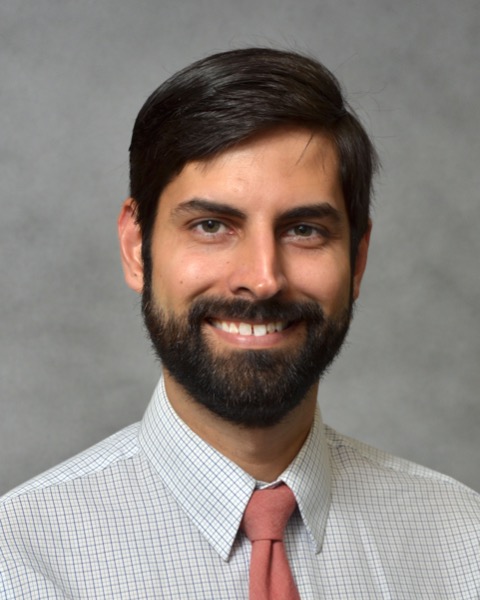Global Neonatal & Children's Health
Category: Abstract Submission
Global Child and Adolescent Health II
152 - Development and evaluation of a national remote-learning Global Health Education Course by the American Academy of Pediatrics
Friday, April 22, 2022
6:15 PM - 8:45 PM US MT
Poster Number: 152
Publication Number: 152.112
Publication Number: 152.112
Jameel J. Winter, University of Minnesota Medical School, Hopkins, MN, United States; Alecia Thonpson-Branch, Montefiore Weiler, Bronx, NY, United States; Maimunat T. Alex-Adeomi, American Academy of Pediatrics, Itasca, IL, United States; James H. Conway, University of Wisconsin School of Medicine and Public Health, Madison, WI, United States; Susan Homerding, AAP, Itasca, IL, United States; Anneka M. Hooft, University of California San Francisco, San Francisco, CA, United States; Suet Kam Lam, Cleveland Clinic Children's, CLEVELAND, OH, United States; Beena D. Kamath-Rayne, American Academy of Pediatrics, Barrington, IL, United States; Janna Patterson, American Academy of Pediatrics, Itasca, IL, United States; Amy R. Rule, CCHMC, Cincinnati, OH, United States; Robyn Wheatley, American Academy of Pediatrics, Itasca, IL, United States; Brett D. Nelson, Harvard Medical School & Massachusetts General Hospital, Boston, MA, United States

Jameel J. Winter, MD
Assistant Professor of Pediatrics
University of Minnesota Medical School
Hopkins, Minnesota, United States
Presenting Author(s)
Background: Participation in global health programs can enhance clinical skills, cultural humility, and engage pediatricians and pediatric trainees in activities that augment their capacity to manage situations in resource-constrained settings. An American Academy of Pediatrics (AAP) periodic survey reported that one-third of respondents had interest in global health but 50% of those did not know how to get started. Furthermore, many individuals participate in these endeavors without adequate preparation.
Objective: To help address these unmet training needs, the AAP developed a virtual Global Health Education Course for pediatric health professionals.
Design/Methods: A diverse panel of experienced pediatric global health educators developed training objectives, content, and format (Tables 1 and 2). Given the challenges that the COVID-19 pandemic has presented, a blended learning solution was offered, which included asynchronous pre-conference coursework and discussion boards and a live virtual one-day event. The virtual nature of this course allowed participation of faculty members from resource-limited settings, as well as increased accessibility to enrollees. Topics included: current global health landscape; high yield topics in neonatal, pediatric and tropical medicine; ethics, equity and decolonization; culture shock; and cultural humility. Access to the material remains available for 6 months after the live event. To evaluate the potential effectiveness of the course, a pre-/post-course knowledge assessment and course evaluation are underway.
Results: A total of 147 individuals participated in the course, exceeding the enrollment target of 125. Enrollees included 46 (31.3%) trainees, 91 (61.9%) practicing physicians, 6 (4.1%) retired physicians, and 4 (2.7%) allied health professionals. Pre-post course knowledge assessments and course evaluations are still in the process of being collected.Conclusion(s): The AAP’s new Global Health Education Course helps address the need for global health training for pediatricians and pediatric trainees in a unique manner. It offered important material in an accessible interactive format, allowing participants to continue practicing at their primary site while gaining high-impact skills and information. Pre/post-test knowledge assessments and feedback solicitation are ongoing. Future iterations will continue to expand offerings, while also assessing further educational impact of these novel programs.
Table 1. Course Objectives.png)
Table 2. Course Content and Schedule.png)
Objective: To help address these unmet training needs, the AAP developed a virtual Global Health Education Course for pediatric health professionals.
Design/Methods: A diverse panel of experienced pediatric global health educators developed training objectives, content, and format (Tables 1 and 2). Given the challenges that the COVID-19 pandemic has presented, a blended learning solution was offered, which included asynchronous pre-conference coursework and discussion boards and a live virtual one-day event. The virtual nature of this course allowed participation of faculty members from resource-limited settings, as well as increased accessibility to enrollees. Topics included: current global health landscape; high yield topics in neonatal, pediatric and tropical medicine; ethics, equity and decolonization; culture shock; and cultural humility. Access to the material remains available for 6 months after the live event. To evaluate the potential effectiveness of the course, a pre-/post-course knowledge assessment and course evaluation are underway.
Results: A total of 147 individuals participated in the course, exceeding the enrollment target of 125. Enrollees included 46 (31.3%) trainees, 91 (61.9%) practicing physicians, 6 (4.1%) retired physicians, and 4 (2.7%) allied health professionals. Pre-post course knowledge assessments and course evaluations are still in the process of being collected.Conclusion(s): The AAP’s new Global Health Education Course helps address the need for global health training for pediatricians and pediatric trainees in a unique manner. It offered important material in an accessible interactive format, allowing participants to continue practicing at their primary site while gaining high-impact skills and information. Pre/post-test knowledge assessments and feedback solicitation are ongoing. Future iterations will continue to expand offerings, while also assessing further educational impact of these novel programs.
Table 1. Course Objectives
.png)
Table 2. Course Content and Schedule
.png)
